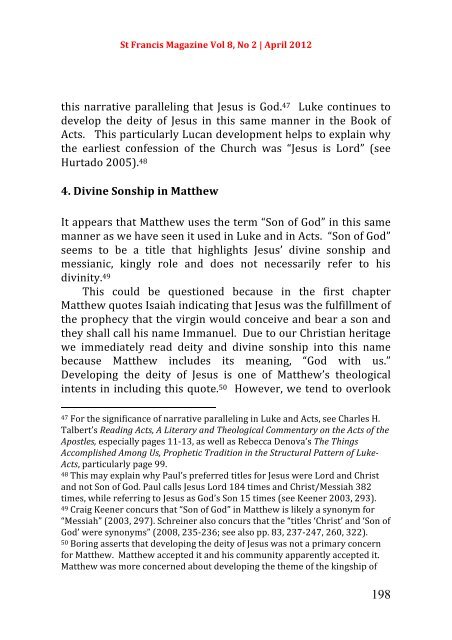Untitled - St.Francis Magazine
Untitled - St.Francis Magazine
Untitled - St.Francis Magazine
You also want an ePaper? Increase the reach of your titles
YUMPU automatically turns print PDFs into web optimized ePapers that Google loves.
<strong>St</strong> <strong>Francis</strong> <strong>Magazine</strong> Vol 8, No 2 | April 2012 this narrative paralleling that Jesus is God. 47 Luke continues to develop the deity of Jesus in this same manner in the Book of Acts. This particularly Lucan development helps to explain why the earliest confession of the Church was “Jesus is Lord” (see Hurtado 2005). 48 4. Divine Sonship in Matthew It appears that Matthew uses the term “Son of God” in this same manner as we have seen it used in Luke and in Acts. “Son of God” seems to be a title that highlights Jesus’ divine sonship and messianic, kingly role and does not necessarily refer to his divinity. 49 This could be questioned because in the first chapter Matthew quotes Isaiah indicating that Jesus was the fulfillment of the prophecy that the virgin would conceive and bear a son and they shall call his name Immanuel. Due to our Christian heritage we immediately read deity and divine sonship into this name because Matthew includes its meaning, “God with us.” Developing the deity of Jesus is one of Matthew’s theological intents in including this quote. 50 However, we tend to overlook 47 For the significance of narrative paralleling in Luke and Acts, see Charles H. Talbert’s Reading Acts, A Literary and Theological Commentary on the Acts of the Apostles, especially pages 11-‐13, as well as Rebecca Denova’s The Things Accomplished Among Us, Prophetic Tradition in the <strong>St</strong>ructural Pattern of Luke-Acts, particularly page 99. 48 This may explain why Paul’s preferred titles for Jesus were Lord and Christ and not Son of God. Paul calls Jesus Lord 184 times and Christ/Messiah 382 times, while referring to Jesus as God’s Son 15 times (see Keener 2003, 293). 49 Craig Keener concurs that “Son of God” in Matthew is likely a synonym for “Messiah” (2003, 297). Schreiner also concurs that the “titles ‘Christ’ and ‘Son of God’ were synonyms” (2008, 235-‐236; see also pp. 83, 237-‐247, 260, 322). 50 Boring asserts that developing the deity of Jesus was not a primary concern for Matthew. Matthew accepted it and his community apparently accepted it. Matthew was more concerned about developing the theme of the kingship of 198







![Reflections on Surah Fatiha and the Lord's Prayer[1] - St.Francis ...](https://img.yumpu.com/49377951/1/184x260/reflections-on-surah-fatiha-and-the-lords-prayer1-stfrancis-.jpg?quality=85)








